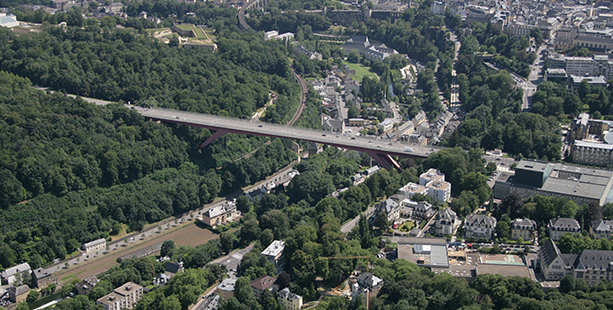
Chamber of Commerce opinion

The Chamber of Commerce has given its opinion on the draft Grand-Ducal regulations aimed at making the housing, landscape, transport, and economic activity zone sectoral master plans (PDS) mandatory. These regulations would bring into force the 17 April 2018 law on land use. The Chamber of Commerce supports this effort and is convinced of the necessity of providing a national framework for decisions that are likely to have a lasting impact on the country and its various stakeholders. However, when studying each sectoral master plan in detail, the Chamber of Commerce notes some weaknesses and a lack of ambition. These could have negative consequences for land development in Luxembourg.
The reasoning behind creating sectoral master plans is to ensure that different land use requirements are met. This enables sectoral policies to be implemented to give new projects space in which to develop. Thus, the mission of the sectoral master plans is to plan the organisation of the Grand Duchy's land development over the long term and in the general interests of the entire population. The policy creates a framework for action by local communal authorities when they take decisions related to the four major planning policy areas: housing, the development of economic activity zones, transport, and the countryside. They thus have a major, long-term impact on many aspects of life for citizens and businesses.
The Chamber of Commerce has consistently favoured giving greater weight to national considerations compared to local concerns regarding land-use planning. This approach leads to greater coherence, efficiency, rational use of natural resources, environmental protection, and sustainable development. This is why the Chamber has supported efforts in legal reform in recent years. However, one of our main regrets is that the current legal framework no longer allows the state to set a deadline for when municipalities must implement the details of the zones of the sectoral master plans. To mitigate this, the Chamber of Commerce suggests creating incentives. These would encourage the relevant local authorities to adapt their general land-use plans (PAG) in accordance with the frameworks established by the sectoral master plans.
Nevertheless, the Chamber of Commerce welcomes the complementarity and convergence of the plans for housing, transport and economic activity zones. These plans appear to be an attempt to correct the lack of symmetry that exists between areas of high employment (particularly Luxembourg City and the surrounding municipalities) and the locations where many people live. This points to an unbalanced situation in this country, which is the result of a lack of coherence in planning policies in recent decades. It is also partially responsible for many of the limitations related to transportation.
As well as these general considerations, the Chamber of Commerce has analysed each sectoral master plan.
Housing sectoral master plan
The Chamber of Commerce believes that strong increases in housing prices are harmful for social cohesion, and put at risk the long term economic attractiveness of the country. Measures need to be taken to increase the supply of residential accommodation; easing of town planning procedures; expansion of zones destined for residential construction; and, above all, maximising use of those plots of land already legally designated for housing.
As for how future priority residential zones will be defined, the Chamber of Commerce supports the clear desire to reinforce residential urban areas such as Esch-sur-Alzette and the Nordstad. It is also an advantage that the majority of newly designated residential areas are served by public transport.
The drawback of this housing master plan is the insufficient quantity of designated land. With 20,360 new homes planned over 481 hectares, this appears to be a modest ambition when the resident population is currently growing at a rate of around 10,000 to 12,000 per year.
Economic activity zone sectoral master plan
Whether for local businesses or international groups, it is vital that they have space to set up and grow. This must be established if Luxembourg is to have a diverse, innovative economy - the development of new economic activity zones is essential. It also helps to spread employment opportunities across the country, with beneficial effects for coordinated and sustainable land-use management and organisation.
New projects seem to be located near to urban centres and main transport links (including motorways). However the total area of activity zones has been revised downwards from when the master plan was first published in 2014. This does not seem to be an appropriate response to growing demand.
Transport sectoral master plan
Transport is another key aspect of development for Luxembourg, touching as it does on how goods and people move. Current land-use development trends are somewhat contradictory. The growth of salaried employment is concentrated in the canton of Luxembourg, while populations are growing quickly in rural areas. The result is pressure on transport infrastructure, with some roads having reached saturation point.
Given this, the Chamber of Commerce approves of the geographic spread of infrastructure projects, and the desire to develop multi-modal systems with particular focus on cycle lanes and park-and-ride schemes.
However, the Chamber invites the government to optimise the public transport network beyond national borders, particularly to connect non-resident commuters with their places of work in Luxembourg.
As regards logistics, the transport sectoral master plan appears to fall short of the sector's ambitions.
Countryside sectoral master plan
The countryside is of key importance to developing Luxembourg's attractiveness as a tourist destination, on top of its contribution to the well-being of the population and the need to preserve our natural environment. However, the Chamber of Commerce cautions against the tendency to over-regulate, which can lead to heavy bureaucracy, more complex administrative procedures, and the growth of excessively restrictive regulatory measures.
The Chamber of Commerce questions the relevance of having a separate sectoral master plan in this area. Many complex legal frameworks already exist regarding environmental protection.
To consult the full opinion (in French) please click on this link.


